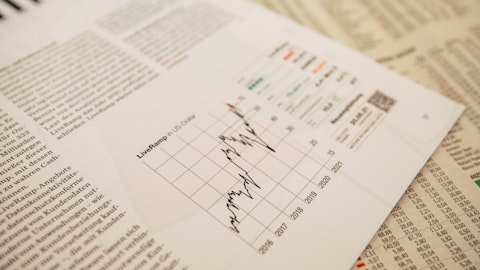Across the board, we’ve been investing heavily. I should also give a chance to Wilford to speak to some of those events and projects that we’ve been heavily investing in as well. But suffice to say versus our original forecast for what we would invest in the first year of the 10 years, we greatly exceeded that during 2023. And we’re looking to do so again in 2024. Wilford, I don’t know if — so you want to add to the non-gaming concession and investments we’re making.
Wilford Wong: Yes. We have, in the past years, been investing heavily in the areas that Grant just described. And by a long way off, we are the leader in the MICE market. So we are still seeing a very strong presence of MICE activities in our properties. For non-gaming, apart from the shows, we’ve been helping to promote Macao as a destination, not just for gaming. Therefore, we have a lot of art exhibitions, cultural shows that really put us apart from the other competitors.
Brandt Montour: Great. Very helpful. Thanks, all.
Grant Chum: Thank you.
Operator: Thank you. Your next question is coming from David Katz from Jefferies. David, your line is live. Please go ahead.
David Katz: Hi. Good evening, everyone. Thanks for taking my questions. I’ll ask to the both on one shot. If I could follow up on the share repurchases, Patrick, not asking about how much or when — but just thinking about how the family stake takes a long-term view on where you’d like to be or how we might think about that evolving over time? And then second, since we last spoke on an earnings call, there’s been an awful lot of activity and focus in Texas. And if you could share some of your views and thesis around what — what the family’s activities and how they might relate to the company and shareholders, that would be helpful as well. Thanks.
Patrick Dumont: Sure. So I think first off, I think we see value in both equities. So we’re very long-term bullish. From a company standpoint, we’re going to continue to be aggressive, as you said before, focusing on investment for growth. Do you see the success of our capital allocation programs, both in Macao as Grant just described in Singapore in driving growth in high-value tourism in diversifying our amenities and by creating margin and revenue expansion. So we’re very focused on investment for growth. That being said, we generate a lot of free cash flow, and we anticipate to generate free cash flow in the future that we’ll be able to use to return capital to shareholders. So I think the company will look to be aggressive and measured over time as we return capital share through share repurchases to shareholders.
I think we’ve always had a dividend is not from the pandemic. I think we like having a dividend. We think it’s helpful for shareholder returns. We think it’s an important component of our overall shareholder value strategy. But that being said, we’re going to be overweight to share repurchases. In terms of Texas, I think the most important thing is that Las Vegas Sands is actively trying to facilitate the development of integrated resorts in the State of Texas and through the liberalization of gaming. And so we’re very excited about it. We think it’s an unbelievable market. Over time, we hope that it happens. I can’t tell you when it’s going to be, but we’re very focused on it as a company, and we like the opportunity to develop some very unique tourism assets, specifically in Dallas.
We think that’s a great market. We’ve been very focused on it. And we think the opportunity there would be a great one. In terms of the family’s activities in Texas, I think we like the state. We’re very obviously happy with our investment there. We’re very excited about it. And we’ll look to be part of the business community there. But in terms of LVS, we’re very focused on bringing integrated resource to decimate resource, the State of Texas and the development opportunity that would exist there.
David Katz: Thank you.
Operator: Your next question is coming from Dan Politzer from Wells Fargo. Dan, your line is live. Please go ahead.
Dan Politzer: Hey, good afternoon, everyone and thanks for taking my questions. I wanted to follow-up on Sands China and as it relates to capital allocation. Your net leverage there, I think, is around three times at this point. It should be much lower than that as you kind of make your way through 2024. How do you think about the subsidiary there resuming dividend payments up to the parent? And then obviously, your stake went up a little bit through the quarter through those debt repurchase. So maybe does that incentivize some of those dividends coming up sooner than later? Thanks.
Patrick Dumont: If it’s okay. I’ll take that one. I think the key thing here, as I just mentioned in the prior question, and as Grant mentioned, as Wilford mentioned, we’re very committed to investing in the long term in Macao. And so our primary focus is going to be deploying capital there for growth. That being said, we are generating meaningful free cash flow there as we did in this last quarter. I think what you’ll look to see over time is that some of the leverage that we put on the balance sheet during the pandemic will decease. So we have a maturity coming up in 2025. We’ll look to decease some of that in front of the refinancing. And our goal is really to bring leverage down in terms of quantum, but then also our leverage is going to come in naturally as our EBITDA stands over time, which is our expectation.
So I think once that occurs, we’re going to start looking to begin the dividend again at the Sands China level. That’s something that’s going to be determined by the Board there. But I think overall, it’s something that we’d like to see. And I think the goal is to begin that dividend in the years ahead. It was a very strong dividend payer in prior years pre-pandemic. And we’d like to become an investment-grade name there, keep that investment-grade rating, invest in the future in terms of scale and scope to grow our business there and then return excess capital through dividends to shareholders there. So that’s the plan.
Dan Politzer: Got it. And then just for my follow-up, as you think about Macao, we’ve talked a bit about the margins and the improvement, more or less, it’s been about 100 basis points quarter-over-quarter. As you think about kind of the trajectory from here, and I know you’re on pace to get back to those 2019 levels how should we think about maybe the pacing of improvement? And do you think that operating expense structure is really in place at this point, you should benefit from scale here on out?
Patrick Dumont: I have one quick comment and I’d like to turn it to Grant. We’ve mentioned this a few times in the past couple of quarters. I think the story of our margin expansion in Macao is going to be based on revenue growth. As the market continues to recover, as tourism continues to recover as more high-value tourists come online, they see the types of high-quality offerings lab, they experience the amenities and the entertainment that Grant referenced earlier, we’re going to continue to grow and expand our customer base. And that will lead to pricing, that will be to expansion, that will lead to revenue growth. So, from that standpoint, I think our long-term margin view is expansion because of the investment and because of what we just described. But I’ll turn it over to Grant to see if he has some additional comments.





